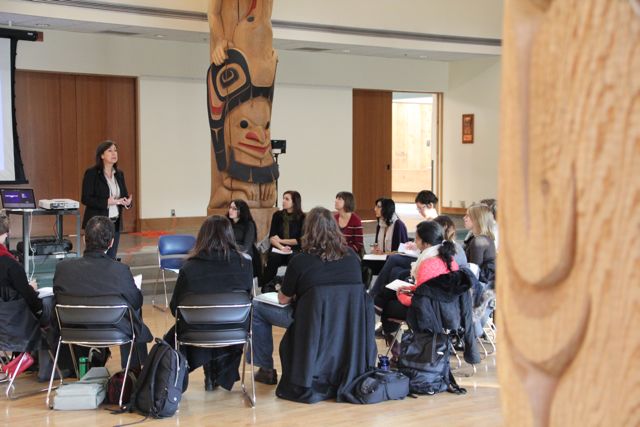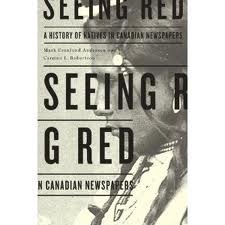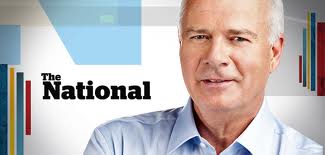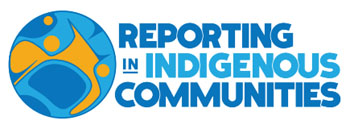05 Nov On ethics & Indigenous representation in the media
Nothing RIIC enjoys more than a good ol’ mind-bending discussion about ethics with journalism students. Dorian Geiger, a journalism student at University of King’s College in Halifax (my alma mater) gave me a ring recently. He’s working on a paper about the portrayal of Aboriginal people and communities in the media. I enjoyed our talk, and he was kind of enough to send me a transcript. Here it is.
Dorian Geiger: What is your official position at the University of British Columbia?
Duncan McCue: I’m an adjunct professor. I’ve got a fulltime job at [the] CBC so teaching is just a part-time gig for me. This year and last year I started teaching a course called Reporting in Indigenous Communities.
Geiger:Explain how your class came about and how your blog ties into that.
McCue: At UBC’s journalism school — in addition to teaching advanced TV and other things — I had been spending a day in our first-year course — it’s a two-year masters program — introducing students to some of the issues they may face when reporting on First Nations in Canada. You can’t teach that in a day. There are too many issues there and a day isn’t enough time.

Students in the Reporting in Indigenous Communities class gather for a lecture at UBC First Nations Longhouse
I’ve known for awhile that I wanted to do something more in-depth. Because the reality is if you’re going to be a reporter in Canada at some point in your career, you’re going to be reporting on First Nations issues – and you may very well end up reporting on First Nations issues regularly. So it’s important to be introduced to this stuff during your education if you can.
I was fortunate enough to go on a fellowship at Stanford University where I worked on two things: one was designing the course Reporting in Indigenous Communities and the other thing was building the website — www.riic.ca — which was specifically for working journalists. Because I know it’s great to be able to impact 15 or 20 students a year at UBC, but there are also a lot of working journalists out there who want to improve their work with First Nations. So the website is there for them to dip into and then see if they can find explanations to some of the challenges they face. That was how it came about.
Geiger: That’s awesome. What piqued your interest in the issue [of Aboriginal’s portrayal in the media]?
McCue: I’m Aboriginal myself… So that’s an important part of my identity. I’m a reporter for [CBC’s] The National who does features of all types. I do all kinds of different issues. But if I have an area of specialization, it’s Aboriginal issues. It’s something that I’ve been reporting on for quite some time.
I have observed as a journalist and as an Aboriginal person an unfortunate LACK of reporting on Aboriginal issues in Canada. There is an underrepresentation of our peo ple in the mainstream media, and also at times, unfortunately, misrepresentation in the media of Aboriginal people. There are, too often, characterizations of Aboriginal people that are awful and in the types of stories that we choose and the way that we frame those stories.
ple in the mainstream media, and also at times, unfortunately, misrepresentation in the media of Aboriginal people. There are, too often, characterizations of Aboriginal people that are awful and in the types of stories that we choose and the way that we frame those stories.
Geiger: Can you briefly describe over the course of history how you’ve seen First Nations portrayed in the media?
McCue: Here, I would refer you to the book Seeing Red, which is a great book that looks at newspaper coverage over the past 100 years in Canada. The authors of that book conclude that unfortunately, the stereotypes that existed a 100 years ago of Aboriginal people being savages, lazy, uncivilized, squaws, all those types of portrayals of Aboriginal people — they’ve persisted in our coverage.
We don’t use those bad words anymore perhaps, but the story frames are still similar. I would argue that the protest and warrior stories — that kind of thing — you can trace it right back to years ago and stories that looked at Aboriginal people as a barrier to progress in Canada. Unfortunately many of the stories about Aboriginal protests today — legitimate protests about longstanding Aboriginal land claims for example — are portrayed as Aboriginal people being a barrier to progress.
Aboriginal people being portrayed as victims is another common frame of stories. We see that in missing women coverage, or stories about the sad state of infrastructure on First Nations reserves, which is not to say that missing or murdered Aboriginal women in Canada or the state of housing on First Nations reserves are deplorable. Because they are. But the way that the mainstream media often portrays these communities is troubling, and, at times, decontextualized in a way that does not explain the colonial background and the reasons for these kinds of things happening. That ends up giving a very two-dimensional image of Indians as those looking for handouts or being pitiful.
Geiger: It’s discussed on your blog, but what could journalists specifically do to better themselves when reporting in this area?
McCue: There’s a checklist I have included on the site. I put that there simply so that if a journalist has no time, which I recognize they don’t, there’s a quick list there of suggestions that people can put into play in their reporting practice.
The bottom line — the undercurrent of the whole site— is act with respect when you go to a First Nations community. Now that might sound like really silly advice. ‘Well of course I’m going to act with respect.’
If you act with respect, if you listen, if you don’t insist that Aboriginal people adapt to our needs — that is the reporter’s needs, and the mainstream newsroom’s needs — but if we adapt our needs to Aboriginal culture, then you’re going to have a much better experience when you’re reporting on Aboriginal people.
That doesn’t mean that stories have to always be positive. Aboriginal people consume the news just as avidly as everybody else in Canada. We know that statistically – at CBC, we’ve measured that. Aboriginal people want to know the news and want to know if there are bad things going on in their community and want their leaders to be held accountable. It doesn’t mean that we should we doing warm and fluffy stories about Aboriginal people but it just means we need to treat them with respect.
Geiger: Different Aboriginal groups interpret gifts and gift-giving rituals differently. We’re taught as journalists not to accept gifts from sources. However, when reporting on indigenous communities, you say the ethical principles of gift giving and receiving become bendable. Could you elaborate on that dilemma?
McCue: You picked up on a good one. I give a lecture in our ethics class at UBC and walk [students] through a number of scenarios that I’ve encountered and other reporters encounter on a regular basis and compare that to the CBC ethics handbook. Gifts are an excellent example.
I ran a story this evening on The National about a pipeline that’s running through some Aboriginal territory and we were at a sweat lodge as part of that piece. I brought tobacco to the fellow who was running that sweat lodge and let us come there with a camera. It cost about $20. I gave him that gift because I understand that that is protocol when you are in a spiritual setting like that. And that is an acknowledgement that is to say ‘thank you for sharing with me; sharing your story with me, sharing your time with me, sharing your wisdom with me. That’s how it’s done within that particular group so that’s why I brought the tobacco. I don’t go doing that for every interview that I do.
Likewise, with regards to receiving gifts, there are times when as a reporter I have been offered gifts — small gifts — with the understanding that I have been asked to witness an event and within west coast Aboriginal culture, to be asked to witness something is an honour. You’re expected to be called upon to recount what you witnessed and the contract there is when someone asks you to be a witness they have to pay you for it. Sometimes it means two dollars. Sometimes it means more. Sometimes it could be a feather. So you’re receiving a gift. Technically speaking that’s completely against CBC policy. But in the context of the culture it would be disrespectful not to accept that gift.
Geiger: Have you ever approached CBC policy makers about these dilemmas?
McCue: Both. I’ve approached them about giving tobacco or giving gifts and also receiving gifts. One of the issues I walk my students through is, ‘okay, so, someone gives you a toonie for being a witness. Is that okay?’ The thing with ethics is there is no clear-cut answer one way or the other. Most people agreed there’s nothing wrong with a toonie. ‘But what if they give you an eagle feather? Or what if they give you a button blanket?’ There is no monetary worth upon the eagle feather but it’s an incredibly huge honour and a lot of cultural understanding goes along with passing that, so what do you do? There’s probably no monetary value upon a button blanket either, but you could probably sell them from anywhere from two to three thousand dollars. I have never been offered a button blanket but I use it as a hypothetical. If it’s in the $20-range then it’s like, okay, no problem, but that’s just a general understanding, but technically you’re not suppose to accept gifts.
What if they offer you a meal? It’s very customary when you go into an Aboriginal community to sit down and break bread with people. Well, what if they invite you to feast? Is that any different from going out with a CEO of a pipeline company who takes you out for dinner? Or an MP who takes you for a $100-meal? Is that any different? So these are all interesting ethical conundrums.
The difference is in Aboriginal community, is these are really deep and long-held cultural protocols. At the very least you should understand them and be able to discuss them with your guest and the people that you’re interviewing. So if they offer you a meal and you feel uncomfortable with it say ‘hey, listen here’s my issue. Here’s my trouble. I have to be objective and unbiased.’ And you talk it over so they understand where you’re coming from. So you try find a balance you can both live with. But to just say, ‘no, I can’t take that,’ and walk away, this is how misunderstandings begin and ferment and you can’t get great access to communities you don’t have mutual respect with.

“This (RIIC) may be the most important addition to Canadian journalism in decades.” Peter Mansbridge
Geiger: I noticed Peter Mansbridge had reacted to this initiative. Could you elaborate on his thoughts on you taking charge on this issue?
McCue: I’ve been reporting on The National for the number of years now and Peter is our guy. He’s our anchor and he’s the face of The National. I was really quite pleased when I approached him and I told him about the work I was doing on my year off and he said ‘that sounds great.’ He wanted to take a look at the site. When he did, he offered an endorsement that I could use publicly and I was pretty flattered by what he wrote and that’s huge. I was very appreciative of him suggesting that this could be helpful for other journalists across the country. I hope he’s right – I hope it is.





